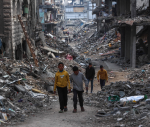You are here
Western powers’ sanctions on Syria harm its people rather than its government
Apr 17,2019 - Last updated at Apr 17,2019
After losing the war on Syria's battlefields, the US and the EU are prosecuting the war by economic means. Although they imposed sanctions early in the eight-year conflict, they have gradually ramped up bans on imports of essential items, and have denied Damascus funds to reconstruct the country. Both these policies harm Syrians rather than their government, which the Western powers still want to oust.
When I last visited Syria a year go, Damascus, its environs, the coast and Homs received electricity 24 hours a day, seven days a week. There were cuts in Aleppo to provide power for industries but there was power for homes at night. When there were cuts, small generators took over, creating a din and pollution but keeping shopkeepers and workshop owners happy.
Today in the capital, electricity is supplied for four hours, alternating with two hour cuts throughout day and night. In the countryside it is three hours on and three hours off. Elsewhere, there are cuts of varying lengths of time. The reason for the cuts is the Western blockade on oil and gas for electricity plants and of fuel, "mazout", for generators. Hospitals, schools, universities and bakeries receive dwindling shipments of mazout.
Iranian ships carrying oil for Syria have, reportedly, been prevented from accessing the Suez Canal due to pressure on Egypt, while an official said that Russian ships loaded with oil have been threatened if they dock at Syrian ports.
My small hotel in Damascus' business district has not had mazout since December and cannot use its large generator. Guests have had a long, cold stay but as in households and shops, the hotel has installed battery lights which switch on during cuts so guests are not left in the dark at night.
Fortunately, electricity switches on and off at specific hours, you can set your watch by the times, so that householders, shopkeepers, businesses and others can schedule jobs. A friend says that his wife does laundry and cooks on an electric ring when there is power, and warms food and makes coffee and tea on the stove during cuts. Friends and I went early to an upmarket restaurant in the Old City one evening so we could sample the pizza as the oven could not work during power outages. Bottled gas, the normal fuel for stoves, is difficult to find and can be purchased with an electronic smart card if there are supplies.
Although subsidised petrol is limited to 20 litres, now every five days, and is bought with smart cards, Damascus, Homs and other cities suffer traffic jams that quickly consume the ration. Smugglers and black marketeers are reaping benefits from shortages by charging high prices to restaurants, factories and shops.
Markets are filled with fruit, vegetables, meat and poultry but prices are high due to the fall in the value of the currency and rising costs of transporting produce to city markets. Syrians on government salaries earn between $40-200 a month, depending on their jobs. Even those with top salaries are struggling.
Meanwhile, with the aid of the UN High Commissioner for Refugees, the World Food Programme, the International Committee of the Red Cross and the Syrian Arab Red Crescent, Syrian non-governmental organisations are helping to resettle displaced and returning refugee families in empty housing, installing windows and doors in looted buildings and providing families with blankets, pots and other essential items. Displaced people and returnees also receive food, medical aid and psychological counselling. Children are given tutorials to help them catch up with lost schooling. But mines and unexploded ordnance must be cleared, and homes, factories, schools, hospitals and shops need to be rebuilt.
Energetic Syrian entrepreneurs are not waiting for reconstruction to begin. In damaged Deraa, where unrest launched warfare in 2011, shops and markets have opened as families have resettled, classes begun in schools and the municipality commenced work. Shops, cafes and car repair garages line rutted roads in empty villages between Deraa and Bosra Al Sham, the site of a splendid Roman ampitheatre and other archaeological treasures.
Although the European Union-UN conference that met in Brussels in mid-March received pledges of $7 billion to provide humanitarian aid to Syria and countries hosting Syrian refugees, none of this money is to be used for reconstruction. Indeed, the very word "reconstruction" is banned. The cost of reconstruction is estimated at between $250-400 billion, a sum only Western and Arab Gulf countries can raise with difficulty. The Pentagon put the cost of the war against Daesh at $7.6 million daily. Spending on warfare is one thing, but rebuiling after a war is another. Western powers, which have promised $10 billion for rebuilding, refuse to commit funds to this process until there is "transition away from" Syrian President Bashar Assad.
Therefore, Syrians who have survived eight years of warfare and remained in the country and who are living in exile in difficult conditions in neighbouring countries are being punished because Assad did not step down in line with the plans of Syria's enemies. War-weary Syrians in Syrian are unwilling to mount fresh protests that could lead to unrest and fighting.
If the government had been toppled, the country would have fractured into fiefdoms controlled by warring warlords, and unrest would have spilled over into Jordan, Lebanon and Iraq, which was transformed into a failed state by the 2003-2011 US invasion and occupation. This is the outcome none of the interfering powers ever considered seriously until 2014, when Daesh seized 30 per cent of Iraq and a similar percentage of Syrian territory, compelling Western governments to take military action against Daesh with no thought of repairing and reconstructing the cities, towns and villages damaged and destroyed in the process.













